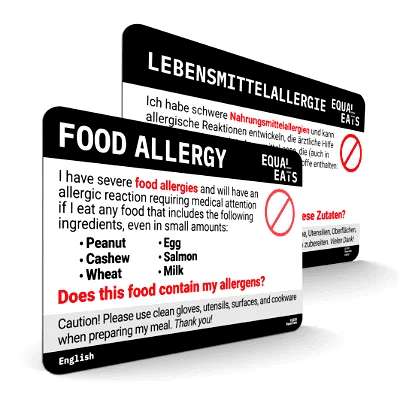
Travelling with Allergies and dietary restrictions

Saturday, August 12, 2023
10:17 AM
If you are travelling, especially in a country that doesn't speak a language you are fluent in, you may have the need to discuss your or your family's allergies with others without knowing the correct words or phrases. You may find it useful to write down what you might need to say, then take a printout, and a copy on your cell phone/tablet/laptop/remarkable/note paper to carry with you. If you or someone in your party is severely allergic, you should carry one or more copies in your passport, so you always have them ready and can pass them out.
For some ideas of what to include, check out our page for some ideas to get you started.
You may want to check these people out: https://equaleats.com/?ref=AbilityOasis (We make a 10% commission if you go with them using this link, if you want to make sure we don't get the commission, just edit the URL to exclude us; 100% of referral links go to charitable causes.) They have a large number of credit card sized cards to explain your allergy to people in a large number of foreign languages. While they may seem expensive at first glance, if you have an allergy that is going to kill you or otherwise spoil a trip for you, the extra cost isn't all that much for the peace of mind and a higher probability of a good trip.
In addition to the convenient card, I like to carry multiple copies that I can hand out, so they can take to the restaurant chef for example and not have to try to get it back. Or to give to a doctor/nurse so they can put it 'on file.'
We'll talk about the Spanish specifically in the link above, but be aware that a lot of language learning courses will teach you the most 'polite' way to say things. While for most conversation this is a great idea, it can be dangerous when it comes to life threatening things.
So while you might have been taught the equivalent of "I'd like to …" "I'd rather …" and then by extension "I'd like to not…" and "I'd rather not …" when ordering food, when it comes to allergies, you need to make sure you are using the more direct - and therefore likely not most polite an therefore not the first way you were taught way of saying "I can not" or "I must not" or other similar direct statements. So be careful if you are new learner of the language that you are suggesting to the person a preference when you are talking about something what cause you harm.